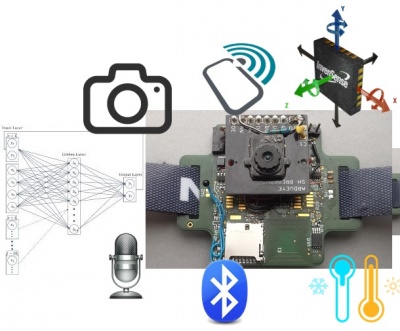Low Power Geolocalization And Indoor Localization
From iis-projects
Contents
Short Description
A new generation of Information Technology is revolutionizing products and people’s everyday life. Sensors and wearable technologies in particular are gaining popularity, with people surrounded by everything “smart,” from smart houses to smartphones, from smart trains to smart cities. However present-day sensor devices are mainly battery-powered and due to limited energy, they are simple with limited computational capabilities or they need to be recharged every day or even hours and thus they miss the expectations for a truly unobtrusive user experience. Geo localization and Indoor localization of moving targets can be achieved with different technologies including RF,sound, optical, vision, or a combination of them. In the context of low-cost embedded systems, the purpose of this project is to investigate how inexpensive off-the-shelf sensors such as GPS, UWB and other RF devices, inertial measurement units (IMUs) placed on the moving target can help improving the localization precision as observed in some previous work [1]. This project abstracts from the specific localization technique and focuses on how the sensor readings are acquired using a microcontroller board and how they can be combined for the purpose of localization. The project will investigate the impact of measurement uncertainty such as noise and bias and a basic sensor fusion model.
The result of the thesis will be a working proof- of-concept prototype that uses microcontrollers and inexpensive sensors. The working prototype should also include a basic sensor fusion model and be extensively tested.
The hardware and software load of the thesis will be balanced according with the skills and preferences of the candidate students when the details task description will be provided before the student project will start. In field, measurements of the system will be performed from the students as important activity in order to evaluate power consumption, reliability, functionality, classification accuracy and energy efficiency and to further optimize the system.
The master or semester project will be developed in close collaboration with Bombardier, the Oerlikon (ZH) Lab.
Depending on the applicant's profile and project type, his tasks may involve some of the following:
- lab. testing/characterization of the existing prototype: verification of the prototype's characteristics w.r. design specification (simulations), measuring power-consumption, and assessing detection performance in lab. Conditions
- High-level software programming, machine learning, wireless communication
- programming the circuit for specific application, field testing, data acquisition
Status: Available
- Looking for Semester and Master Project Students
- Supervisors: Michele Magno
Prerequisites
(not all need to be met by the single candidate)
- experience using the laboratory instrumentation - signal generators, oscilloscopes, DAQ cards, Matlab etc.
- analog electronics and signal conditioning with operational amplifiers: amplifiers, filters, integrators etc. (not mandatory)
- knowledge of microcontroller programming and PC programming (C/C++, preferably microcontroller with Bluetooth Low Energy but it is not mandatory)
- basic knowledge on signal processing is a plus.
- plus is knowledge on printed circuit board (PCB) using Altium.
Character
- 30-40% Theory
- 40-50% Implementation
- 20% Testing
